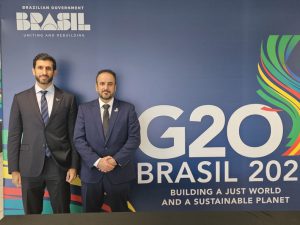ABU DHABI / WAM
The UAE Ministry of Finance has completed its participation in the second round of working group meetings under the Finance Track of the 2024 G20 in Brasília, Brazil, held between March and April 2024.
The ministry participated in working group meetings that included the Global Partnership for Financial Inclusion (GPFI), the Global Alliance against Hunger and Poverty Task Force (TF-Alliance), the International Financial Architecture Working Group (IFA), the Framework Working Group (FWG), the Infrastructure Working Group (IWG), the Sustainable Finance Working Group (SFWG), and the Taskforce on a Global Mobilization against Climate Change (TF-CLIMA).
The UAE reaffirmed its commitment to promoting equality both within and among countries, demonstrated through initiatives such as cross-border infrastructure development and financial inclusion. The UAE also actively contributed to the FWG’s agenda on measuring and assessing inequality. In this context, the UAE discussed its ongoing efforts to advance financial well-being through regulatory reform and the Financial Infrastructure Transformation Programme launched in 2023.
In its pursuit of supporting strong, sustainable, balanced and inclusive growth, the UAE emphasised its focus on multilateral cooperation and sustainable and inclusive trade, including the UAE’s $10 million grant to support several key World Trade Organization initiatives aimed at developing and least-developed countries.
The UAE also promoted sustainable development and energy transitions and underscored the importance of scaling up finance for vulnerable countries to invest in development priorities.
The UAE delegation showcased the country’s tangible efforts, including the $200 million pledge to the Resilience Sustainability Trust to support climate resilience in vulnerable countries and advance sustainable finance efforts.
They also emphasised the importance of international cooperation in addressing the macroeconomic and social impacts of climate change and the need for affordable, predictable, and long-term finance for developing countries. The potential of innovative instruments such as green sukuks to finance private and public investment for comprehensive and sustainable economic and social development goals was also highlighted, inspiring the audience with the country’s commitment to a greener future.
In line with the Brazilian Presidency’s priority to reinvigorate multilateralism and promote the reform of global governance institutions, the UAE also advocated for multilateral development banks’ reforms. This included promoting enhanced MDB cooperation to deepen their collaboration with the private sector as well as system-wide approaches to mitigate, manage, and diversify risk. Moreover, the UAE drew upon the significant COP28 outcomes in this area, showcasing its leadership and commitment to global financial stability.
 The Gulf Time Newspaper One of the finest business newspapers in the UAE brought to you by our professional writers and editors.
The Gulf Time Newspaper One of the finest business newspapers in the UAE brought to you by our professional writers and editors.
